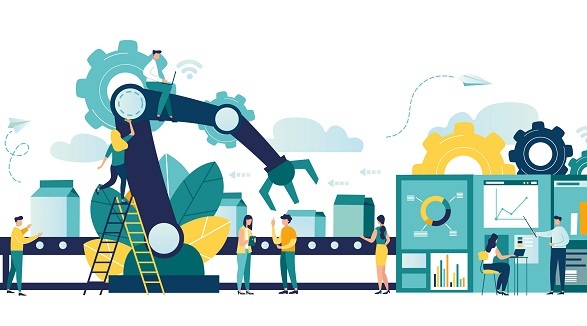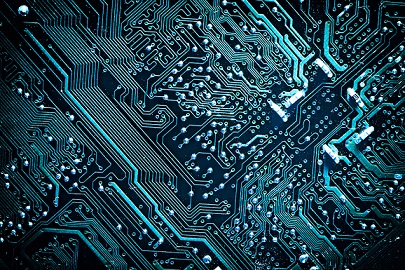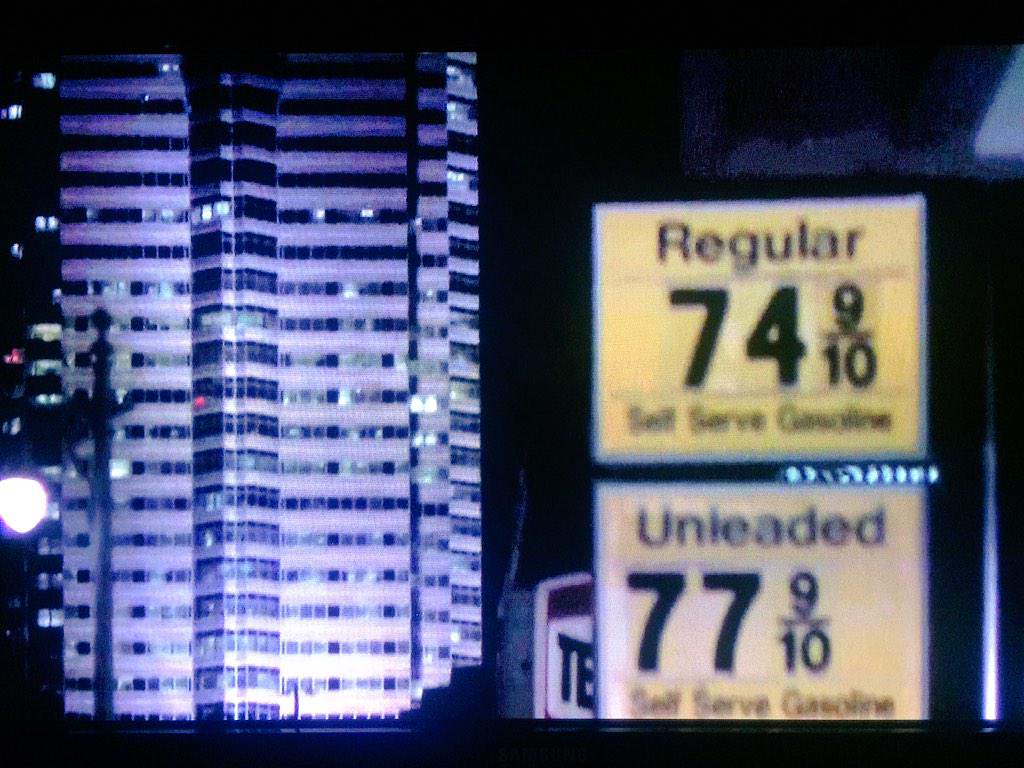Technology Creates Abundance

This is a concept that @taskmaster4450 has been banging the wardrum on for years. It's been rattling around my brain ever since, and it's a very good lesson to remember in the world of economics and finance.
The spark that catalyzed this post was some random tweet that triggered me hard yesterday. It read, "What would the Founding Fathers have to say about the price of eggs today?" Needless to say... my response was unkind, as is often the case when resolving human to human interactions. Just kidding I'm a robot. Fooled you good didn't I?

So what would the Founding Fathers have to say about the current price of eggs? Probably that they are insanely cheap and it's amazing a profit can be turned at such a low price. Current price volatility is meaningless compared to hundreds of years in technological advancement.
Seriously though, coal-fueled electric power plants did not exist until the 1880's. The country was founded in 1776. Do tha maths.
https://www.in2013dollars.com/Eggs/price-inflation
It's surprising what certain items at the grocery store would have set you back in 1920. For instance, a dozen eggs cost 47 cents ($6.06 today), one pound of round steak cost 40 cents ($5.16 today), and three pounds of macaroni cost 25 cents ($3.22 today).
I can't even find data for 200 years ago, and the data that I do get is riddled with inconsistency and likely can't be trusted to an accurate degree. However, the trend is obvious and true:
- technology creates abundance
- abundance creates supply
- high supply lowers prices
- economics 101
Unfortunately the Keynesian economic theories upon which the legacy model is founded HATE DEFLATION. Deflation is the worst thing in the world, according to modern economic theory. Whether or not Bitcoin can prove that theory wrong is yet to be seen, but somehow I doubt it given all the research I've done. Intelligently allocated inflation is the real killer dapp of crypto. Hive is lightyears ahead in this regard, even if it has an entire mountain range to climb to get where it needs to be.

Back to the basics
How much did a modern data phone cost in 1985? The answer is that modern smartphones did not exist, and if you were in possession of one the government wouldn't think twice about murdering you and reverse engineering your alien tech for personal gain. There's really no doubt about such a fact.
Citizens who live under the poverty line today can afford a car and rent and a Netflix subscription. What could poor people afford to buy a few centuries ago? Scraps of food so they wouldn't starve to death? If they were lucky.
When's the last time a friend of yours died from a bacterial infection? That used to be a quite common occurrence before penicillin was invented. What about dentistry? What do you think that was like before pain-killers like Novocain? Care to guess what's worse than needles? Passing out from pain.

So yeah life isn't fair and there's a lot of messed up stuff going on in the world today, but it's all a matter of perspective and frame of reference. The world is becoming more volatile recently. Waves move up and waves move down. Those who complain about every downswing while taking every upswing for granted are not to be taken seriously. This is the mindset of the hypocrite and should be avoided if possible. It is our responsibility to surf these waves and not wipe out with the rest of the plebs living paycheck to paycheck.
At the end of the day it doesn't matter if USD was worth x10 more a century ago than it is today... unless someone in your family is a chucklehead that left their legacy to rot in a bank account holding fiat. Literally no one does that, so why does everyone focus on dollar devaluation and how much money was worth before they were even born?

This classic screen capture from Die Hard gets a lot of attention. In 1988 gas was 75 cents a gallon. OMG why isn't gassoline still 75 cents today that's not fair! Really? How much money were you making in 1988? The federal minimum wage was $3.35.
Nobody cares!
They want all of the benefits and none of the drawbacks as they reminisce nostalgically about "better days". But those days were never actually better, they were just different, and we simply remember them as better in every way because that's how our dumb brains work. Again, this is a hypocritical greed-based mindset and should be avoided if possible.
Rather than thinking about how much "cheaper" things used to be back in the day, the question we should really be asking is:
How many hours of work would it have taken to buy that?
Within this context it's easy to see that it doesn't matter if eggs only cost 50 cents a hundred years ago. If it takes an hour of work to earn 50 cents: this is the real metric: one hour. Once we start measuring the cost of product in terms of time it becomes much more apparent that goods and services back in the day were more expensive than they are today... and that's including central bank exploitation over time. Take away the currency exploitation and we can see that crypto will usher in an insane world of even more exponential abundance.

Conclusion
Technology creates abundance. It is known. Interestingly enough, technology is moving directly into the field of currency and even intelligence itself. Currency will become exponentially abundant (and valuable) because of technology. Intelligence itself will become more abundant because of technology. There are going to be a lot of bumps and bruises along the way. All we can do is try to enjoy the ride even if it is a bit uncomfortable.
We would also do well to remember that there are simply more people in the world today than there were in the past. More people means less resources per person. It's simple math that most tend to ignore within these conversations of wealth distribution. Sure, rich people today are richer than they've ever been, and the disparity between rich and poor has never been greater, but that variable doesn't cancel out other important variables to consider as well.
Nostalgia is a trap. We tend to think about the past longingly in these scenarios and forget about all the hardship when it suits our narrative. Then we wrongfully compare those false memories to the present day and come to incorrect conclusions. Couldn't be me.
Posted Using LeoFinance Beta
The price of a T-shirt in hours of time used to create it has gone way way down.
From about 20 hours to a few minutes.
If we had real money, then the price of a T-shirt should have dropped significantly.
But, it seems to have stayed about the same, or going up slowly due to inflation of the monetary supply.
Inflation is MUCH greater than we are told.
Because you need to add the monetary inflation with the technology deflation of cost.
And the problem with inflation is, that back in 1988 you spent your time earning a dollar.
If you spent that dollar, you could have had a gallon of gasoline, but if you saved it, now you can have a ¼ gallon of gasoline.
And the bigger problem with inflation is that it doesn't effect everyone equally.
What happens instead is the central banksters and their friends get to spend their money first.
Basically, we get all the inflation that they produced.
Yeah I've done a post or two about how central banking has been able to siphon technological gains into their pocket at an alarming rate. Crypto cuts them off from being to do this because crypto is both technology and money, so money can't be used to siphon the gain because it is even higher quality than the siphon.
Im someone who stop living from the past about 5 years ago when my second son was born, always thinking that there is no reason to think about the past its just over cant modify, future havent happent yet cant modify, present got to keep trucking but have never thought about old times this way "...were never actually better, they were just different..." great anallogy and its true, after covid ppl often ask me if things will go back to normal or get better and I always ask them back...whats normal to you? whats better for you? they living the past and want it back like its a birth right or if they deserve it, world keeps changing and most of the time so far its not for the best, all we can do is live the present and enjoy life, thx for sharing ✌️
The problem with the discussion that is conventiently overlooked:
there is a lot available today that could not be purchased in the past. What did smartphones, Tesla stock, NFTs, and cable subscriptions come from? Did they just magically appear.
people claim to hate inflation yet get upset when the value of their homes, stocks, and bonds go down.
as stated in another comment, the US household is up 130x compared to 1915. This means for less hours work (since the average workweek declines) we are getting more in terms of currency.
Pricing numbers do not count all the stuff is for free. Look at this list:
Just consider what a weekly AMA would have cost Khal 35 years ago.
The standard of living for much of the world keeps increasing yet people overlook it.
Posted Using LeoFinance Beta
Thanks for this it fills the gaps of a lot of the stuff I missed.
Congratulations @edicted! You have completed the following achievement on the Hive blockchain And have been rewarded with New badge(s)
Your next target is to reach 30500 replies.
You can view your badges on your board and compare yourself to others in the Ranking
If you no longer want to receive notifications, reply to this comment with the word
STOPCheck out our last posts:
Support the HiveBuzz project. Vote for our proposal!
🙂
https://twitter.com/27706436/status/1624496564407246848
https://twitter.com/1415155663131402240/status/1624622070180220928
The rewards earned on this comment will go directly to the people( @seckorama, @rzc24-nftbbg ) sharing the post on Twitter as long as they are registered with @poshtoken. Sign up at https://hiveposh.com.
It’s so weird that gasoline at the pump still has that nine-tenths of a cent as part of the price. Yeah, like anyone’s going to buy five gallons of $3.359 gas and get a half cent back in change from $16.75
All part of the marketing because people are willing to shop around for cheaper gas even if the discount is basically nothing.
Quite an insightful post. I realized decades ago that things like electric lights, hot and cold running water, and cloth are incredibly undervalued today (or then, actually). 500 years ago only kings or the incredibly rich had much in the way of nice cloth, and not many of them had hot and cold indoor plumbing. No one had electric anything. They couldn't buy electricity at any price. That's amazing, and one of the most important things I learned from living innawoods for a while.
Indoor plumbing is very nice.
However, some of the things you say here aren't as true as they might appear, such as that inflation doesn't matter. It matters right now that your money you have in fiat is being eroded at ~10% or so. The price having inflated from 200 years ago, not so much, as you point out, but the inflation sucking the value out of your pocket today does matter. At least when I'm taxed I get to hand it over and bitch. Inflation is just sneaky theft.
Resources aren't fixed either. More people absolutely doesn't mean fewer resources for each of us. More people means more people inventing things, and that's how we get nifty new things like electricity. There isn't less electricity today than there was 500 years ago. Iron, copper, gold, food, anything you care to name that people mine or make isn't either reduced relative to how many people there are. People mine with far higher productivity today, and because there's more miners, there's more copper available to the billions more of us on Earth today - and even the absolute supply of copper has increased, though not one more speck of it has been created in the bowels of the Earth.
500 years ago we didn't know about the almost infinite supply of copper in space. There may be a fixed supply of copper on Earth, but no rational person thinks we're going to always be limited to Earth. How long do you think it will be before we start accessing that unlimited supply of copper in space? A decade? Two? Ten? I'll bet you everything I own it will be less than ten decades before we see copper mined in space.
It might actually happen very soon, as the sample return mission is going to collect stuff on Mars and send it back to Earth, which may well contain at least trace amounts of copper.
Living things? I think in the future the possibility to use aquaponics to feed ourselves will prove to work fine on Mars, or even just in space habitats, and that will be the beginning of exporting terrestrial life into the infinite barren universe. There may be fewer species today than there was 10 years ago, but I am willing to bet the blood in my veins there will be more species alive 100 years from now than there are now, because we're going to need all kinds of ecosystems to fit all kinds of habitats, and CRISPR means we'll make them as we need them.
Venus has a thick CO2 atmosphere, that is about room temperature at 50k feet or so, and 1 atmosphere of pressure of breathable gas on Venus at that elevation would float in midair nicely. There's also not insignificant trace amounts of sulphuric acid in Venusian atmosphere, and it just so happens that deep sea vent life on Earth, which lives at incredible pressure and temperature naturally, is actually chemosynthetic, not photosynthetic like surface ecosystems. The chemical it's based on is sulphuric acid, squirting out of the black smokers vent life clings to in the deep ocean.
Lots of tasty organisms might be very easily adapted to float around in Venus' atmosphere and process the CO2 and sulphuric acid into O2 and food, which colonists could live large on.
I'm long life. I think I just need to HODL long enough for better minds than mine to figure all this stuff out, so I can enjoy the fruits of their labor. And that's the real benefit of technology. It allows our forebears to build things that outlast them, and then we get to enjoy their hard life's work for free. Today, that makes me very appreciative of our hardworking ancestors.
Thanks!
All good points.
The reason I underplay inflation so aggressively is that I never hold any fiat whatsoever.
All the incentives align for me to spend any fiat almost immediately.
Sometimes my work will imply that others are doing this as well, even if they aren't.
This can lead to a certain friction that results in me being called out, and that's fine.
Although most people do seem to live paycheck to paycheck, so there is that.
I guess I technically do as well, if crypto is thought of as a product that we buy.
Not everyone can spend fiat immediately. I can't. While I do everything I can to barter and get others to pay my rent, I only managed that about 1/2 the months last year, and my landlady doesn't take plastic, Hive, or BTC. She'd take a check, but I'm not setting up a bank account just for her. I'd still have to have cash in it to float checks.
Nice thing about crypto is it seems to be readily sold for cash when you need cash. I have to say that I can only assume that is true, because I've never ever. Ever. I'm not against crypto as money. I just already have enough nontrustworthy banks and etc. to deal with, and see no good reason to add centralized exchanges.
If there were dexes that ignored KYC I could use without a bank, I'd make some effort. From time to time I am told there are, and I have a look, but there really aren't, and some detail or another means my deets would be attached to my ability to exchange currencies, so I don't. I do wish there were, because I would. In the meantime, cash transactions are anonymous, and that's what I do if I can't wangle someone else to pay my obligations.
Good points.
We are damn lucky to exist now, and we are much better off then our predesessors. I am very happy to have my house go up in value, thank you. A little gratitude and math skills go a long way towards making one happy and grateful to be here now.
Posted Using LeoFinance Beta
Whenever the issues of nostalgia and "good old times" vs. "brave new world" come up, I'm always reminded about comparisons of the way two different wars affected my my part of the world - WW2 in 1940s vs. break-up of Yugoslavia in 1990s.
What happened in 1990s was, by all objective criteria - number of casualties, levels of destruction etc. - puny compared to absolute horror that went on during WW2. Yet, if you compare the way those who endured 1990s still are affected by those events to the way their parents and grandparents handled their lives after 1945, you might find that WW2 was apparently less traumatic.
It does make a certain sense. Life that was shattered in 1990s was significantly better than life that was shattered in 1940s. For example, in most cases someone burning your house in 1940s meant that you would later have to build something new out of mud and wooden branches gathered in the immediate surroundings, unlike today when you would have to spend a fortune on concrete, bricks, power lines, water supply and sewers, building permits, bribe for local officials etc.
Posted Using LeoFinance Beta